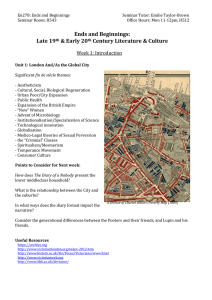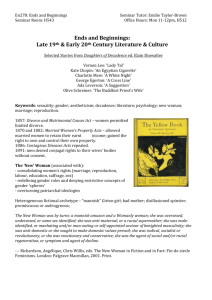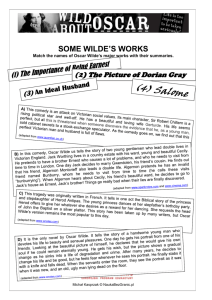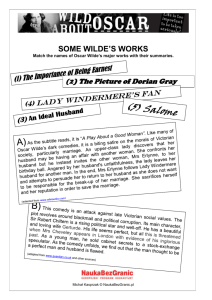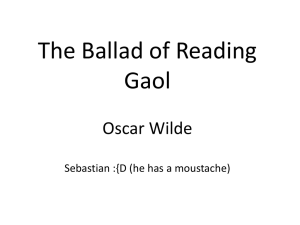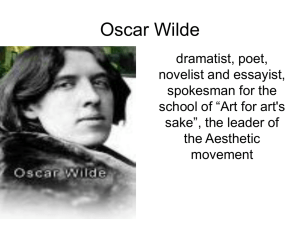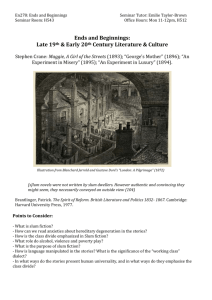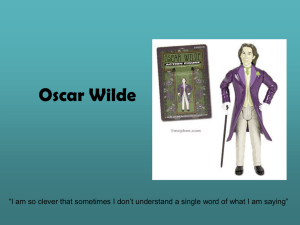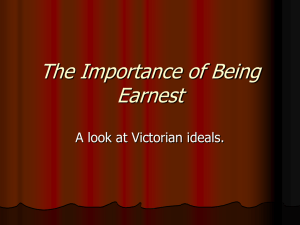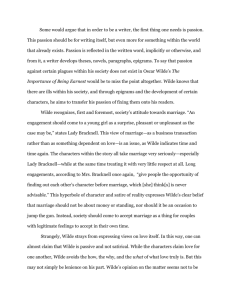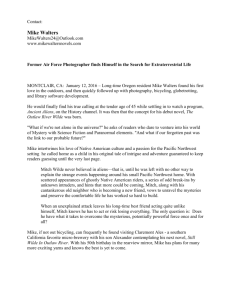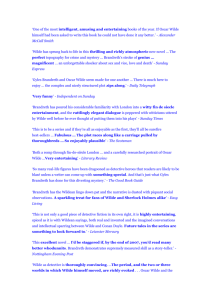Week 3 - De Profundis
advertisement
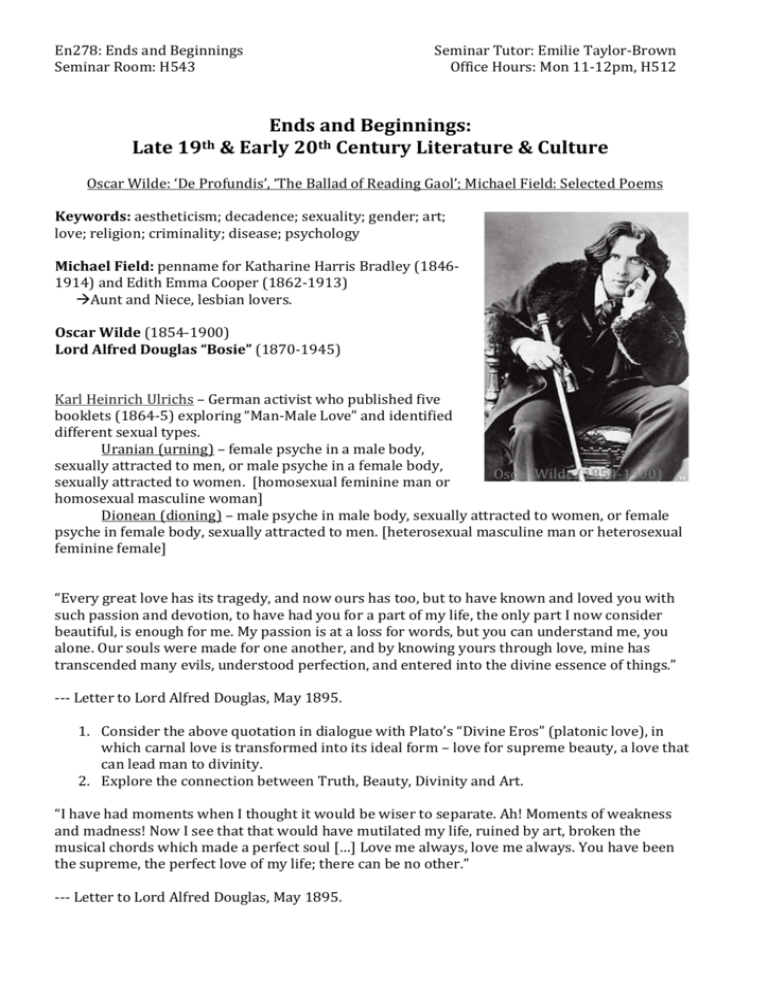
En278: Ends and Beginnings Seminar Room: H543 Seminar Tutor: Emilie Taylor-Brown Office Hours: Mon 11-12pm, H512 Ends and Beginnings: Late 19th & Early 20th Century Literature & Culture Oscar Wilde: ‘De Profundis’, ‘The Ballad of Reading Gaol’; Michael Field: Selected Poems Keywords: aestheticism; decadence; sexuality; gender; art; love; religion; criminality; disease; psychology Michael Field: penname for Katharine Harris Bradley (18461914) and Edith Emma Cooper (1862-1913) Aunt and Niece, lesbian lovers. Oscar Wilde (1854-1900) Lord Alfred Douglas “Bosie” (1870-1945) Karl Heinrich Ulrichs – German activist who published five booklets (1864-5) exploring “Man-Male Love” and identified different sexual types. Uranian (urning) – female psyche in a male body, sexually attracted to men, or male psyche in a female body, Oscar Wilde (1854-1900) sexually attracted to women. [homosexual feminine man or homosexual masculine woman] Dionean (dioning) – male psyche in male body, sexually attracted to women, or female psyche in female body, sexually attracted to men. [heterosexual masculine man or heterosexual feminine female] “Every great love has its tragedy, and now ours has too, but to have known and loved you with such passion and devotion, to have had you for a part of my life, the only part I now consider beautiful, is enough for me. My passion is at a loss for words, but you can understand me, you alone. Our souls were made for one another, and by knowing yours through love, mine has transcended many evils, understood perfection, and entered into the divine essence of things.” --- Letter to Lord Alfred Douglas, May 1895. 1. Consider the above quotation in dialogue with Plato’s “Divine Eros” (platonic love), in which carnal love is transformed into its ideal form – love for supreme beauty, a love that can lead man to divinity. 2. Explore the connection between Truth, Beauty, Divinity and Art. “I have had moments when I thought it would be wiser to separate. Ah! Moments of weakness and madness! Now I see that that would have mutilated my life, ruined by art, broken the musical chords which made a perfect soul […] Love me always, love me always. You have been the supreme, the perfect love of my life; there can be no other.” --- Letter to Lord Alfred Douglas, May 1895. En278: Ends and Beginnings Seminar Room: H543 Seminar Tutor: Emilie Taylor-Brown Office Hours: Mon 11-12pm, H512 I had given you my life, and to gratify the lowest and most contemptible of all human passions, Hatred and Vanity and Greed, you had thrown it away. In less than three years you had entirely ruined me from every point of view. For my own sake there was nothing for me to do but to love you. I knew if I allowed myself to hate you, that in the dry desert of existence over which I had to travel, and am travelling still, every rock would lose its shadow, every palm tree be withered, every well of water prove poisoned at its source. (De Profundis, 82) Points to Consider How to the authors present the relationship between Art and sexuality? Is sexual identity socially constructed? Consider Wilde’s attempts to separate Art and Life. How do the authors use Art to express and critique love? How does De Profundis modify Wilde’s earlier ideas about Art? What function does the age gap perform in both relationships? In ‘The Artist as Critic’ and ‘The Decay of Lying’ Wilde observes that ‘the artist is the creator of beautiful things’ and argues for the rejection of mundane reality in favour of romance and beauty. How does Wilde present the relationship between Art and Truth in De Profundis? What place does religion have for the authors in relation to Art and to love? Consider Art as a method of communication, particularly the power of words. How does Wilde draw connections between Art and Christ? Explore the relationships between sexual, legal and artistic identity. Consider the connection between behaviour and physiology/mental state. What is the connection between criminal lunatics and artists, and how did Wilde try to exploit this? Art and Sexuality Terrible as what you did to me was, what I did to myself was far more terrible still. I was a man who stood in symbolic relations to the art and culture of my age. […] I treated Art as the supreme reality, and life as a mere mode of fiction: I awoke the imagination of my century so that it created myth and legend around me: I summed up all systems in a phrase and all existence in an epigram. Along with these things, I had things that were different. I let myself be lured into long spells of senseless and sensual ease. I amused myself with being a flaneur, a dandy, a man of fashion, I surrounded myself with the smaller natures and meaner minds. (100) Truth in Art is not any correspondence between the essential idea and the accidental existence; it is not the resemblance of shape to shadow, or of the form mirrored in the crystal to the form itself […] Truth in Art is the unity of a thing with itself: the outward rendered expressive of the inward; the soul made incarnate: the body instinct with spirit. (110) Art is a symbol because man is a symbol. It is, if I can fully attain to it, the ultimate realisation of the artistic life. For the artistic life is simple self-development. Humility in the artist is his frank acceptance of all experiences, juts as Love in the artist is simply that sense of Beauty that reveals to the world its body and soul. […Christ recognised] in the entire sphere of human relations imaginative sympathy, which in the sphere of Art is the sole secret of creation. He understood the leprosy of the leper, the darkness of the blind, the fierce misery of those who live for pleasure, the strange poverty of the rich. (114) En278: Ends and Beginnings Seminar Room: H543 Seminar Tutor: Emilie Taylor-Brown Office Hours: Mon 11-12pm, H512 Sexuality and the Law The petition of above named prisoner humbly sheweth that he does not desire to attempt to palliate in any way the terrible offences of which he was rightly found guilty, but to point out that such offences are forms of sexual madness and are recognised as such not merely by modern pathological science but by modern legislation, notably in France, Austria, and Italy, where the laws affecting these misdemeanours have been repealed, on the ground that they are diseases to be cured by a physician, rather than crimes to be punished by a judge. --- Letter to the Home Secretary, July 1896. [Your mother spoke of your vanity, your temper and your recklessness with money] of the degeneration and change that had taken place in you. She saw, of course, that heredity had burdened you with a terrible legacy, and frankly admitted it, admitted it with terror. (58) CONSTANCY [from Wild Honey (1908)] I love her with the seasons, with the winds, As the stars worship, as anemones Shudder in secret for the sun, as bees Buzz round an open flower: in all kinds My love is perfect, and in each she finds Herself the goal: then why, intent to teaze And rob her delicate spirit of its ease, Hastes she to range me with inconstant minds? If she should die, if I were left at large On earth without her---I, on earth, the same Quick mortal with a thousand cries, her spell She fears would break. And I confront the charge As sorrowing, and as careless of my fame As Christ intact before the infidel.
